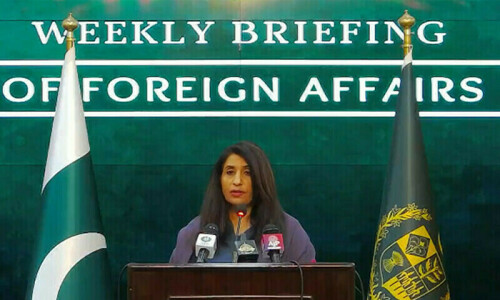A decade after the killing of Osama bin Laden at a private compound in Abbottabad, the fate of Dr Shakil Afridi, the central character accused of helping the American CIA in tracing the Al-Qaeda chief, still hangs in the balance.
Presently serving a 23-year prison term in solitary confinement at Sahiwal Central Prison in Punjab, his plea against his conviction by an assistant political agent in 2012 and upholding that conviction by the then commissioner FCR (Frontier Crimes Regulation) in 2014 has been pending before the Peshawar High Court.
On March 11 a two-member bench of the high court had referred his petition to a three-member bench established by the court for hearing certain categories of cases belonging to erstwhile Federally Administered Tribal Areas (Fata).
Similarly, a revision petition filed by the government for enhancing the sentence awarded to Dr Afridi has also been referred to the three-member bench.
Soon after the killing of Osama bin Laden, Dr Afridi was taken into custody by the Pakistani intelligence agencies.
A report of the joint investigation team (JIT), on the basis of which Dr Afridi was convicted, claimed that he had supervised a fake vaccination campaign in Abbottabad which had resulted in tracing Osama bin laden.
On May 23, 2012, it was made public that Dr Afridi, a former agency surgeon in Khyber Agency (now Khyber district) was tried by an assistant political agent/additional district magistrate Bara (Khyber Agency) on multiple counts under the mechanism given in section 11 of FCR.
The trial court convicted him on four counts under different sections of Pakistan Penal Code including section 124-A (sedition), 121-A (waging or attempting to wage war against Pakistan), section 123 (concealing design to wage war against Pakistan) and section 123-A (condemnation of the creation of Pakistan).
On three counts he was sentenced to 10 years imprisonment, whereas on the fourth count he was sentenced to three years.
The trial court directed that his sentences should run consecutively so he had to undergo 33 years imprisonment. He was also fined collectively Rs320,000.
Moreover, the trial court did not convict Dr Afridi over the charges of helping CIA claiming that it lacked jurisdiction and recommended that he may be produced before the concerned court for further proceedings.
Since that conviction order, Dr Afridi’s family has been engaged in a legal battle.
Initially, an appeal was filed before the FCR’s commissioner, the appellate forum under the FCR, which on Aug 29, 2013, disposed it of with the observation that such a serious nature case should have been tried by the political agent himself under proper law and rewaj so as to ensure absence of iota of any doubt regarding merit and transparency.
“Therefore, the subject case is remanded back to political agent/session judge Khyber Agency in order to weigh afresh the pro and against arguments of both the parties under law and rewaj. However, the appellant will not be released on bail till the final conclusion of the case,” the commissioner ordered.
The said order of the commissioner was challenged under section 55-A of the FCR before the Fata Tribunal, the third and last legal forum under the FCR, which on Dec 18, 2013, remanded the case back to the FCR commissioner with the direction to pronounce a clear order regarding his trial by the political agent on charges of having links with a militant organisation.
The FCR commissioner on March 15, 2014, again heard his appeal and upheld his conviction. However, the commissioner set aside his conviction under section 123-A (condemnation of creation of state of Pakistan) of Pakistan Penal Code (PPC), as that provision was not in the schedule of offences under the FCR. His sentence was thus reduced to 23 years imprisonment with fine of Rs220,000.
However, the FCR commissioner had also ordered that the sentences should run consecutively and not concurrently.
Dr Afridi challenged the said order of the commissioner by filing the instant revision petition before the erstwhile Fata Tribunal, where it remained pending till the tribunal was abolished in 2018.
As all the cases pending before the tribunal were transferred to the high court so was the case of Dr Afridi.
Presently, because of prevalent situation of Covid-19 pandemic, the high court has issued guidelines for hearing different cases. According to the said guidelines some categories of important cases should be given preference in hearing including that of habeas corpus petitions, bail matters, applications related to stay matters, cases intended to be decided on basis of compromise or withdrawal, etc.
So there is no likelihood of fixation of Dr Afridi’s case in the near future.
He has been kept in solitary confinement at Sahiwal Central Prison and only some close family members are permitted to meet him.
Family sources said that around a month ago they had met him and presently due to Covid-19 pandemic the authorities had placed ban on meeting prisoners there.
A legal expert dealing with cases under the former FCR told Dawn that in several such cases the high court had provided relief to the convicts/accused persons. He said most of the the cases transferred to the high court from Fata Tribunal were based on weak evidence as procedure under the former FCR was different than that in the settled districts.
Another important point, he said, was that in the instant case the APA, who was acting as a magistrate, had ordered consecutive running of sentences. He added that there were several judgments of superior courts wherein relief was provided to convicts by ordering that the sentences awarded in a single trial should run concurrently.
Even if his conviction is upheld and he is only provided relief that his sentences should run concurrently then he would undergo around 10 years imprisonment, which he has already spent in detention.
Published in Dawn, May 3rd, 2021














































